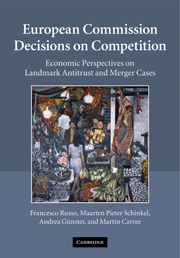 European Commission Decisions on Competition
European Commission Decisions on Competition Book contents
- Frontmatter
- Contents
- List of figures
- List of tables
- List of abbreviations
- Table of legislation
- Table of equivalences
- Acknowledgments
- 1 Introduction
- 2 Horizontal restrictions
- 3 Abuse of dominance
- 4 Licensing
- 5 Vertical restrictions
- 6 Joint ventures and alliances
- 7 Restrictions to competition by Member States
- 8 Mergers and acquisitions
- Annex I Decisions related to procedural issues
- Annex II Table of landmark decisions described in the book
- Annex III Table of mergers blocked by the European Commission in chronological order
- Annex IV Table of landmark merger decisions described in the book in alphabetical order
- Annex V Table of antitrust decisions in alphabetical order
- Bibliography
- Index
6 - Joint ventures and alliances
Published online by Cambridge University Press: 04 August 2010
- Frontmatter
- Contents
- List of figures
- List of tables
- List of abbreviations
- Table of legislation
- Table of equivalences
- Acknowledgments
- 1 Introduction
- 2 Horizontal restrictions
- 3 Abuse of dominance
- 4 Licensing
- 5 Vertical restrictions
- 6 Joint ventures and alliances
- 7 Restrictions to competition by Member States
- 8 Mergers and acquisitions
- Annex I Decisions related to procedural issues
- Annex II Table of landmark decisions described in the book
- Annex III Table of mergers blocked by the European Commission in chronological order
- Annex IV Table of landmark merger decisions described in the book in alphabetical order
- Annex V Table of antitrust decisions in alphabetical order
- Bibliography
- Index
Summary
Introduction
Joint ventures and alliances are forms of cooperation that undertakings, often active on the same relevant market, can use to achieve common market objectives. In an alliance, undertakings coordinate their activities and so partially integrate their commercial interests. A joint venture is a separate company, created for a special purpose and typically fully owned by the mother company(ies). Joint ventures are often used for the joint development, exploitation, and commercialization of a new technology or product. Such cooperative efforts carried out by the undertakings can generate and promote efficiencies in different ways and contribute to welfare. Common examples of the possible beneficial effects of joint ventures are concentrated research efforts, rationalized distributive and commercial structures, and the provision of a better-structured set of services.
Joint ventures and alliances can also raise serious anticompetitive concerns. The firms involved may use their cooperation agreements as a vehicle to exchange information and coordinate actions beyond what would strictly be necessary for achieving efficiency gains. That is, their cooperation may induce collusion. Typically, when competing firms involved in the venture cooperate, their market power increases and it is not always straightforward to tell whether that increase was brought about by synergies or restrictive clauses in the agreement and the stifling of competition. Hence, joint ventures and alliances should come under close scrutiny by the competition authorities, especially when market power was already significant before the setting up of the joint venture.
- Type
- Chapter
- Information
- European Commission Decisions on CompetitionEconomic Perspectives on Landmark Antitrust and Merger Cases, pp. 270 - 300Publisher: Cambridge University PressPrint publication year: 2010


